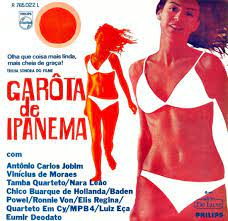The Girl from Ipanema (The Movie)
The Famous Song Gave Inspiration to a Film with a Terrific Soundtrack
The Movie
Garota de Ipanema is a film from 1967, directed by Leon Hirszman, which was inspired by the famous song. The idea to turn the song into a film came from the cinema novo auteur Glauber Rocha, but it is not a hardcore cinema novo film. Vincíus de Moraes was involved in preparing the script and in the production of the film.
The film follows the Ipanema life of 17 old Márcia, who is studying to get admitted to university, who is going to the beach, who is attending parties, who is bored with her family, who becomes intersted in various men she meets and so on. At some of the parties we see an impressive line-up of musicians performing, as if it were one the gatherings of the Bossa Nova gang: Tamba 4, Nara Leão, Chico Buarque, Ronnie Von, Baden Powell, Vinícius de Moraes, Dori Caymmi. We also get glimpses of Ruben Braga, Suzana de Moraes, Dorival Caymmi, Pixinguinha, Maria Bethânia and Bené Nunes, among others.
It was a natural idea to offer the principal part to the real “Girl from Ipanema”, Helô Pinheiro; and actually she was offered the role. But as on other occasions, her husband and her father got in between. There seems to be a hint to this early in the film, where a film producer wants to shoot Márcia on the beach, but her somewhat possesive boyfriend intervenes and says no on her behalf.
On the surface, the Márcia lives a carefree middle class life, but at a certain stage she meets a photographer who gets her to reflect on which type she wants to be. Watching a candomblé ritual on the beach initiates a series of surreralistic scenes where she endures the anxiety of choosing her own way of life. Finally, during carnival – the existential challenges provoked by carnival is a recurrent theme in Brazilian songs and movies – she realizes (I think) that life simply is to mask as various persons.
Below you find the released soundtrack. All the music was recorded for the film. The songs are carefully chosen to underline certain points or moods in the film.
Garota de Ipanema Soundtrack
- Chico Buarque & Elis Regina: “Noite dos Mascarados” (Buarque) Chico wrote this song as a substitute for the song “Tamandaré”, which had been prohibited. It contains his response to the censorship with the point that, at carneval as well as in song writing, you can mask as anyone. The song was written for the show Meu Refrão, but Vinícius de Moraes suggested it should also be included in the film as a duet with Elis Regina, one of the few times these two big names worked together. In the film, the song represents the conclusion.
- Nara Leão: “Lamento no Morro” (Jobim/de Moraes) One of the beautiful love songs from the stage play Orfeu da Conceição from 1956. Contrary to the original somewhat old school samba cançâo version by Roberto Paiva, this version is a delicate bossa nova arrangement with congenial singing by Nara Leão backed by Tamba 4. Definitely among the better versions.
- Orquestra: “Surfboard” (Jobim) Tom saw surfing for the first time in his life 1965 in California while he was recording there. Surfing was not known in Brazil at that time. He composed the melody in the style of Rôberto Menescal, which Menescal was the first to acknowledge – he even recorded it himself. Probably, Jobim also thought about Menescal’s strong interest in all (other) forms of water sport. However, at the time of the film (1967), surfing has arrived to Rio as we see early in the film.
- Tamba 4: “Ela É Carioca” (Jobim/de Moraes) An homage to the beautiful women of Rio. It was first recorded by Os Cariocas in 1963. Tamba 4’s vocal harmonies are more interesting, and their version is overall swinging better.
- Vinícius de Moraes: “Poema dos Olhos da Amada” (de Moraes/Soledade) Vinícius’ poem to the beloved’s eyes was inspired by his love for Lila Bôscoli, the then 22 years old sister of the journalist and song writer Ronaldo Bôscoli. One evening in 1952 in Los Angeles, where he was working at the time, he showed the unpublished poem to some friends. Paolo Soledade sensed a strong musical form in the poem, and he immediately wanted to set it to music, which Vinícius appreciated very much. At this time, Viníciues was still married to his first wife Tati, but he would later marry Lila. Vinícius sing himself, the guitar player is Dori Caymmi.
- Orquestra: “A Queda” (Jobim) A small orchestral piece by Tom Jobim – the existential surrealistic jump.
- Orquestra: “Tema de Abertura” (Jobim/de Moraes) A variation of the theme, the melody of “Garota de Ipanema” which opens the film.
- Ronnie Von: “Por Você” (Enoé/de Moraes) Ronnie Von was one of the early rock musicians in Brazil (but rock itself came late in Brazil). This is probably the only iê-iê-iê song by Vinícius, who was not an admirer of the genre. But of course, it is a love song. (Brazilians named rock ‘iê-iê-iê’ after the Beatles’ ‘yeah-yeah-yeah’).
- Chico Buarque: “Chorinho” (Buarque) A small love choro performed in the classical bossa nova style with, later augmented by swinging piano by Tamba 4. Chico later complained about the film, firstly that he was not comfortable with acting, and secondly, that there was too much drinking going on, or rather, his already serious drinking at the time got amplified during the shooting of the film.
- Baden Powell: “Ária para se Morrer de Amor” (de Moraes) Aria to dying from love, an instrumental ballad theme composed by Vinícius and interpreted by Baden Powell.
- Quarteto em Cy & MPB4: “Rancho das Namoradas” (Barroso/de Moraes) Written in 1962 as one of four collaborations between Vinícius and the great Ary Barroso. Here a female and a male vocal group join forces. The arrangement is nice and clean. But in spite of its comparatively rather excessive arrangement, Nara Leão’s version from about the same time draws more attention, because she consciously and deliberately brings more attention to the sexual associations of the lyrics. Unknown backing.
- Orquestra: “Tema sa Desillusão” (Jobim/de Moraes) Another variation of the theme, “Garota de Ipanema”, a moment of frustration for Márcia.
The orchestral bits were arranged by Eumir Deodato. Chico Buarque recorded alternative versions of his two songs for his 1967 album Chico Buarque de Hollanda Volume 2.
You can watch the complete film here:






Leave a Comment